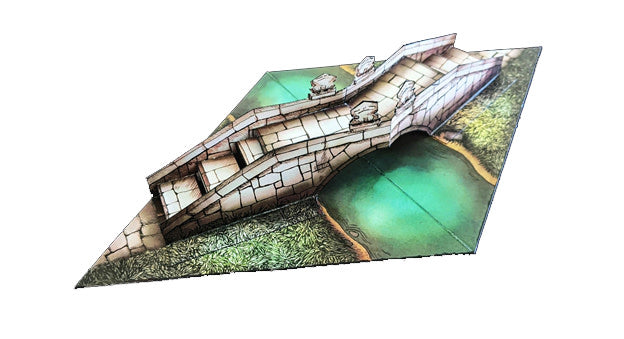
Bridge Pop-Up Terrain, 12 Inch - Digital Download - Printing & Assembly Required
- HEXAGON || Digital download for a hexagon-shaped pop-up that forms a 12" castle wall - The perfect place to hatch a "storming the castle" plot - All you need now is a wheelbarrow and a holocaust robe!
- TABLE TOP GAMING || Designed and curated for use in 28mm scale tabletop games - Perfect for combining with miniatures, grasses and other terrain components
- PRINTABLE || Simply print, assemble and enjoy - Kit is intended to be printed out on cardstock
- ASSEMBLY REQUIRED || Additional supplies required include a hobby knife, double-sided tape and a thicker material, such as cardboard, to be used as backing - For help, watch the video walkthrough instructions that are available online
- POP-UP ENGINEERING || Kit involves measuring and complex geometry and is, therefore, a great educational tool when learning about building and when exercising spatial reasoning
Castle Wall Pop-Up Terrain, 12 Inch
This is a PDF file that can be printed out and assembled into pop-up terrain. This terrain could be used for tabletop gaming, education, and imaginative play! The kit is intended to be printed on cardstock. Additional supplies including a hobby-knife, double-sided tape, and a thicker material such as cardboard to use as backing are required. Video walkthrough instructions are available online if you get stuck.
Pop-up engineering encourages the participant to examine and improvise new ways to solve physical problems. As measuring and complex geometry is involved, paper pop-up construction is a powerful tool in building and exercising spatial reasoning.
Recommendations from Mike Evans, founder of Stonehaven Miniatures:
As you craft these pieces of pop-up terrain, I recommend taking time to consider the forces that are in play and what enables each part to move into place as they open and close. When you glue a part in place, imagine how it will interact with the other parts and with the base. I recommend folding the setting you are working on soon after you have glued a part in place (when the glue is not quite dry so you can modify the positioning if needed) in order to understand it's role and to ensure that it is functioning properly.

